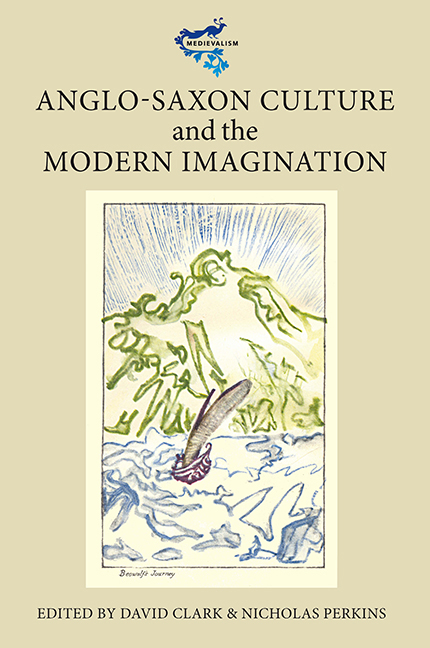Book contents
- Frontmatter
- Contents
- List of Illustrations
- Contributors
- Foreword
- Acknowledgements
- Abbreviations
- Introduction
- 1 From Heorot to Hollywood: Beowulf in its Third Millennium
- 2 Priming the Poets: The Making of Henry Sweet's Anglo-Saxon Reader
- 3 Owed to Both Sides: W.H. Auden's double debt to the literature of the North
- 4 Writing for an Anglo-Saxon Audience in the Twentieth Century: J.R.R. Tolkien's Old English Chronicles
- 5 ‘Wounded men and wounded trees’: David Jones and the Anglo-Saxon Culture Tangle
- 6 Basil Bunting, Briggflatts, Lindisfarne, and Anglo-Saxon Interlace
- 7 BOOO Seeing Beowulf in Pictures and Print
- 8 Window in the Wall: Looking for Grand Opera in John Gardner's Grendel
- 9 Re-placing Masculinity: The DC Comics Beowulf Series and its Context, 1975–6
- 10 P.D. James Reads Beowulf
- 11 Ban Welondes: Wayland Smith in Popular Culture
- 12 ‘Overlord of the M5’: The Superlative Structure of Sovereignty in Geoffrey Hill's Mercian Hymns
- 13 The Absent Anglo-Saxon Past in Ted Hughes's Elmet
- 14 Resurrecting Saxon Things: Peter Reading, ‘species decline’, and Old English Poetry
- Index
1 - From Heorot to Hollywood: Beowulf in its Third Millennium
Published online by Cambridge University Press: 20 April 2017
- Frontmatter
- Contents
- List of Illustrations
- Contributors
- Foreword
- Acknowledgements
- Abbreviations
- Introduction
- 1 From Heorot to Hollywood: Beowulf in its Third Millennium
- 2 Priming the Poets: The Making of Henry Sweet's Anglo-Saxon Reader
- 3 Owed to Both Sides: W.H. Auden's double debt to the literature of the North
- 4 Writing for an Anglo-Saxon Audience in the Twentieth Century: J.R.R. Tolkien's Old English Chronicles
- 5 ‘Wounded men and wounded trees’: David Jones and the Anglo-Saxon Culture Tangle
- 6 Basil Bunting, Briggflatts, Lindisfarne, and Anglo-Saxon Interlace
- 7 BOOO Seeing Beowulf in Pictures and Print
- 8 Window in the Wall: Looking for Grand Opera in John Gardner's Grendel
- 9 Re-placing Masculinity: The DC Comics Beowulf Series and its Context, 1975–6
- 10 P.D. James Reads Beowulf
- 11 Ban Welondes: Wayland Smith in Popular Culture
- 12 ‘Overlord of the M5’: The Superlative Structure of Sovereignty in Geoffrey Hill's Mercian Hymns
- 13 The Absent Anglo-Saxon Past in Ted Hughes's Elmet
- 14 Resurrecting Saxon Things: Peter Reading, ‘species decline’, and Old English Poetry
- Index
Summary
To make a beginning is to miss things out; we are never ‘from the egg’, but always launched in medias res. And the middle of things is where we pick up the story of Beowulf, by which I mean the story of the poem, not the story in the poem. What this essay assumes is that Beowulf, as it is enacted in its sole surviving manuscript, the Nowell Codex, now part of London, British Library MS Cotton Vitellius A. xv, is not the beginning of the story of the work we call Beowulf, but already an adaptation, a refraction. Even in the first glimpse we have of Beowulf, an early eleventh-century performance of narrative material from the first millennium, the poem is already in movement, transitory (læne) and in transition. As the Nowell Codex Beowulf is not only writing, but also a reading, as all writing must be, this essay argues that subsequent creative responses to Beowulf are not, therefore, different in essence from the manuscript text itself. Consequently, although the Nowell-Beowulf marks the opening out of a story in medias res, it is not itself a point of origin against which the authenticity of other uses of the Beowulf material are to be benchmarked. Subsequent performances of the Beowulf material, acts which literary criticism has traditionally labelled ‘reception’, are rather an integral part of the narrative of Beowulf-the-work. We should see the work not as an object, fixed in a web of written text and in need of atomizing analysis of its linguistic parts, nor even as an event in time, requiring historical contextualization, but rather as a process through time.
After developing some of these introductory statements about Beowulf as always already in motion, this essay then reads two very different imaginative responses to Beowulf made early in the twenty-first century: Seamus Heaney's poem ‘Helmet’, published in 2006, and the film Beowulf (dir. Robert Zemeckis), released in 2007. I hope to show that Beowulf continues to have cultural ‘use’ (something all works must possess if they are not to atrophy) across three millennia, and that Anglo-Saxon poetry continues to be productive in contemporary imagination, where it is as political as it was in the late tenth/early eleventh centuries.
- Type
- Chapter
- Information
- Anglo-Saxon Culture and the Modern Imagination , pp. 13 - 30Publisher: Boydell & BrewerPrint publication year: 2010

